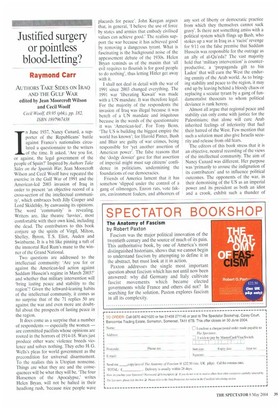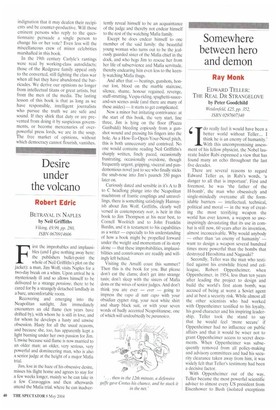Justified surgery or pointless blood-letting?
Raymond Carr
AUTHORS TAKE SIDES ON IRAQ AND THE GULF WAR edited by Jean Moorcroft Wilson and Cecil Woolf Cecil Woolf, £9.95 (pbk), pp. 182, ISBN 1897967438 In June 1937, Nancy Cunard, a supporter of the Republicans' battle against Franco's nationalists circulated a questionnaire to the writers of the time. It asked, "Are you for, or against, the legal government of the people of Spain?' Inspired by Authors Take Sides on the Spanish War, Jean Moorcroft Wilson and Cecil Woolf have repeated the exercise in the Gulf War of 1991 and the American-led 2003 invasion of Iraq in order to present 'an objective record of a cross-section of the intellectual community', which embraces both Jilly Cooper and Lord Skidelsky, by canvassing its opinions. The word 'community' is revealing. Writers are, like theatre `luvvies', most comfortable with their own kind, including the dead. The contributors to this book conjure up the spirits of Virgil, Milton, Shelley, Byron, T. S. Eliot, Auden and Swinburne. It is a bit like pinning a tuft of the immortal Red Rum's mane to the winner of the Grand National.
Two questions are addressed to the intellectual community: 'Are you for or against the American-led action against Saddam Hussein's regime in March 2003?' and whether that military intervention will 'bring lasting peace and stability to the region'? Given the leftward-leaning habits of the intellectual community, it comes as no surprise that of the 71 replies 50 are against the war and even more are doubtful about the prospects of lasting peace in the region. It does come as a surprise that a number of respondents — especially the women — are committed pacifists whose opinions are rooted in the horrors of 1914-18. Wars just produce other wars: violence breeds violence and solves nothing. They echo H. G. Wells's pleas for world government as the precondition for universal disarmament. To the realists this is Utopian nonsense. Things are what they are and the consequences will be what they will be. 'The four Horsemen of the Apocalypse,' writes Helen Bryan, will not be halted in their headlong rush, 'because nice people wave
placards for peace'. John Keegan argues that, in general, 'I believe the use of force by states and armies that embody civilised values can achieve good.' The realists support the war because it has achieved good by removing a dangerous tyrant. What is fascinating is the background noise of the appeasement debate of the 1930s. Helen Bryan reminds us of the maxim that 'all evil requires to flourish is for good people to do nothing', thus letting Hitler get away with it.
I shall not deal in detail with the war of 1991 since 2003 changed everything. The 1991 war 'liberating Kuwait' was made with a UN mandate. It was therefore legal. For the majority of the respondents the invasion of Iraq was illegal because it was bereft of a UN mandate and iniquitous because in the words of the questionnaire it was 'American-led'. For Tony Berm, 'The US is building the biggest empire the world has known'; for Harold Pinter, Bush and Blair are guilty of war crimes, being responsible for 'yet another assertion of American power'. The false reasons that the 'dodgy dossier' gave for that assertion of imperial might must sap citizens' confidence in politicians, undermining the foundations of our democracies.
Friends of America lament that it has somehow 'slipped under the control of a gang of oilmongers. Enron rats, vote fakers, environment foulers, and abhorrers of
any sort of liberty or democratic practice from which they themselves cannot suck gravy'. Is there not something amiss with a political system which flings up Bush, who stokes up a war in Iraq as a 'racist' revenge for 9/11 on the false premise that Saddam Hussein was responsible for the outrage as an ally of al-Qa'eda? The vast majority hold that 'military intervention' is counterproductive, a 'propaganda gift to bin Laden' that will earn the West the enduring enmity of the Arab world. As to bringing stability and peace to the region, it may end up by leaving behind a bloody chaos or replacing a secular tyrant by a gang of fundamentalist theocrats to whom political deviance is rank heresy. Almost all argue that regional peace and stability can only come with justice for the Palestinians; that alone will cure Arab inherited feelings of inferiority that fuel their hatred of the West. Few mention that such a solution must also give Israelis security and release from old fears.
The editors of this book stress that it is an objective, neutral recording of the views of the intellectual community. The aim of Nancy Cunard was different. Her purpose was 'primarily to arouse the indignation of its contributors' and to influence political outcomes. The opponents of the war, in their demonising of the US as an imperial power and its president as both an idiot and a crook, exhibit such a thunder of indignation that it may deafen their recipients and be counter-productive. Will those eminent persons who reply to the questionnaire persuade a single person to change his or her vote? Even less will the miscellaneous crew of minor celebrities marshalled in this book.
In the 19th century Carlyle's rantings were read by working-class autodidacts; those of the Redgrave family appeal only to the converted, still fighting the class war when all but they have abandoned the barricades. We derive our opinions no longer from intellectual titans or great artists, but from the men of the media. The lasting lesson of this book is that as long as we have responsible, intelligent journalists who pursue the truth we are safe and sound. If they shirk that duty or are prevented from doing it by suspicious governments, or become mercenaries of overpowerful press lords, we are in the soup. The free market of opinions, without which democracy cannot flourish, vanishes.













































































 Previous page
Previous page